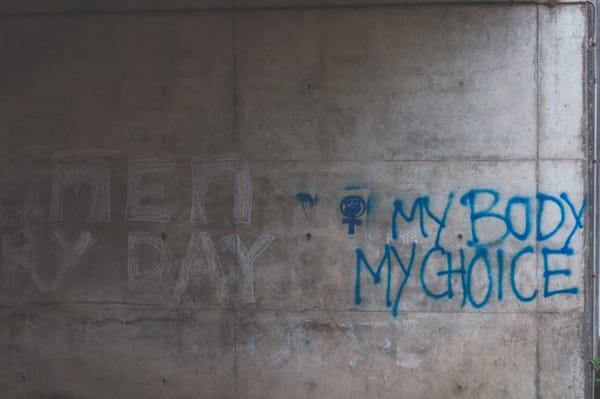The early termination of nuance: arguments around repealing the 8th
Those arguing against the 8th amendment all too often turn to arguments that blur lines, and play politics with serious issues.

Later this month, on May 25th, the Republic of Ireland will hold an historic vote: whether or not to repeal the 8th Amendment of the Irish Constitution, which states:
As such, television, radio and, of course, social media have been rife with proponents of both a ‘Yes’ vote – advocating repealing the Amendment and liberalising abortion rights laws in the country – and a ‘No’ vote. There is one argument, amidst the many banded about, with which I take issue, and that I wish to try and address here. Whilst the argument is one that is used to advocate a pro-abortion rights stance, I want to be clear that I am not arguing against having the right to have an abortion, but against the logic, and claimed importance, of a specific argument used for it; each side retains legitimate and logical arguments, and I am not coming down on either side. The argument in question, used by pro-abortion rights activists, is this: “I believe that a woman has the right to choose what to do with her body”.
In my opinion, although a woman’s choice certainly comes into the issue to some degree, it is not the central point on which the debate rests, and its continued inflammatory use suggests you are either for women having any right to choose anything, and so pro-abortion rights, or against women having the right to choose anything, and so against, creating an unnecessary stifling of opinion and discussion.
“Current rhetoric places the burden of argument solely around women’s choice, without dealing with complexity”
The debate of abortion ultimately rests on at what stage one believes an unborn foetus is alive, such that its termination is considered either an innocuous action, like removing a small growth of cells, or such that its termination is considered equivalent to killing another human being. For instance – do we propose that the child is entirely not alive before birth, even a few seconds before delivery? I doubt that most people would agree with that. Similarly, I doubt most people would describe a day-old zygote as being alive; so the answer must lie in a grey area somewhere in between.
If you believe that the unborn foetus is not alive, then the expectant mother can do what she likes (subject to my second point later on), much as we wouldn’t care if she elected to have plastic surgery, or get a tattoo. If you believe that an unborn foetus is alive, then it isn’t simply another part of the woman’s body, and a more nuanced approach must be taken. Is the foetus fully alive, such that no one has a right to terminate it, in the same way you can’t murder someone? Or is the foetus alive in some diminished capacity? If so, what are the ramifications of this? Can we terminate the foetus if there are medical complications with the mother? What about when there aren’t any, but she simply doesn’t want to have the baby? It is only at this late stage that we can begin to discuss a woman’s right to choose, and thus a woman’s right to choose is very much a secondary consideration, placed firmly in the shadow of the debate around whether or not a foetus is alive. Current rhetoric, however, seems to place the burden of the argument solely around the issue of women’s choice, conflating the issues and fuelling pithy, virtue-signalling arguments that don’t really deal with the complexity at stake.
“This is a dangerous game of proxy, that blurs lines and plays politics with significant issues”
Now, I hear you say, surely a woman has a right to choose for herself whether she thinks the foetus is alive or not, and act accordingly? I would counter with this: Moral relativism, rightly or wrongly (a little joke there), is practised in most secular countries by way of democratic consensus: we all largely agree that it’s wrong to murder people, so it’s against the law. In this framework, I as an individual don’t have the right to decide for myself whether killing is wrong, and I can’t take action – such as killing them – based on my personal assessment. Abortion shouldn’t be any different. With abortion, a country makes a decision as to how it views the life of a foetus, and at what stage, and what the laws should be in line with that view; they thus vote on their view of morality, and its place in the law, in the same democratic process through which all our legislation is enshrined. Individuals don’t have the right to choose their own morals and apply them in contravention to law, law that has canonised the moral consensus of the people. Abortion is no exception.
Furthermore, the implication of the binary nature of this argument – you’re either pro women’s choice, or against it – and the proxy this seems to play for your stance on abortion also seems to cruelly ignore any rights of the father. A foetus is not the exclusive property of a mother simply because it resides in her womb. Babies have fathers too. Just because the DNA of the father resides in the body of the mother, doesn’t remove the fact that it exists, and, by right of paternity, belongs (in the way that any child belongs to a parent) to him. Where is his say? That is not to demand that the male voice overpowers or vetoes that of the female – but, as parents of a child, together, they should be respected and consulted. What does women’s choice have to do with the decision of two parents, made together? Again, there is plenty of scope for debate around ownership, and at what point a bundle of cells becomes a child, that has parents, who have rights; my point is that, even as a secondary argument in the issue, women’s rights do not stand alone as a deciding factor.
To be unequivocally clear: my argument is not for or against actually having the right to have an abortion. What I’m trying to demonstrate is that one particular argument, the right of a woman to choose what to do with her body, is far less relevant to the actual issue at hand than activists are making it. In my opinion, this is a dangerous game of proxy, that blurs lines and plays politics with serious and socially significant issues.









